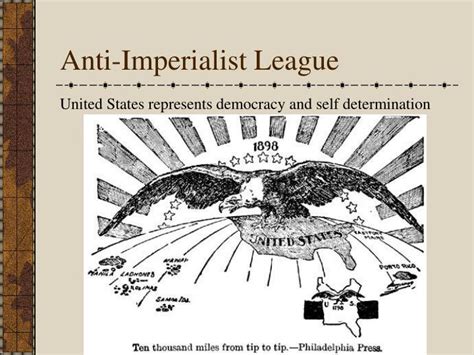The Anti-Imperialist League (AIL) was an American organization founded in 1898 to oppose the United States’ annexation of the Philippines following the Spanish-American War. The AIL advocated for the self-determination of the Filipino people and opposed the imperialist policies of the United States government.

Formation and Goals
The AIL was founded by a group of prominent intellectuals, activists, and politicians, including Mark Twain, William Jennings Bryan, Andrew Carnegie, and Carl Schurz. The League’s main goal was to prevent the United States from acquiring the Philippines as a colony, arguing that such annexation would violate the principles of democracy and self-government.
Membership and Support
The AIL attracted a diverse membership, including both Republicans and Democrats, as well as prominent businessmen, labor leaders, and religious leaders. The League received financial support from wealthy philanthropists and donations from the public.
Tactics and Activities
The AIL employed a variety of tactics to promote its cause, including:
- Public education: The League organized lectures, rallies, and other events to raise awareness of the issue of imperialism.
- Political lobbying: The AIL lobbied Congress and the executive branch, urging them to reject the annexation of the Philippines.
- Legal challenges: The League filed lawsuits challenging the legality of the annexation and the subsequent suppression of the Filipino independence movement.
Impact and Legacy
The AIL played a significant role in the debate over the annexation of the Philippines. Although it failed to prevent the United States from taking control of the islands, the League helped to raise public awareness of the issue and contributed to the growing anti-imperialist sentiment in the country.
The AIL’s legacy extends beyond its activities in the late 19th century. The League’s principles of self-determination and opposition to imperialism have continued to inspire activists and movements around the world.
Table 1: Membership of the Anti-Imperialist League
| Name | Affiliation |
|---|---|
| Mark Twain | Author and Humorist |
| William Jennings Bryan | Democratic Politician |
| Andrew Carnegie | Industrialist and Philanthropist |
| Carl Schurz | Republican Politician and Editor |
| Samuel Gompers | Labor Leader |
| Jane Addams | Social Reformer |
| Henry Demarest Lloyd | Journalist and Activist |
| Edward Atkinson | Economist |
| Moorfield Storey | Lawyer and Civil Rights Activist |
| George Fred Williams | Populist Politician |
Table 2: Tactics of the Anti-Imperialist League
| Tactic | Description |
|---|---|
| Public education | Lectures, rallies, and other events to raise awareness of imperialism. |
| Political lobbying | Urging Congress and the executive branch to reject annexation. |
| Legal challenges | Filing lawsuits challenging the legality of annexation and the suppression of the Filipino independence movement. |
| Grassroots organizing | Establishing local chapters and mobilizing supporters. |
| International cooperation | Collaborating with anti-imperialist groups in other countries. |
Table 3: Impact of the Anti-Imperialist League
| Impact Area | Description |
|---|---|
| Public opinion | Raised awareness of imperialism and influenced the debate over the annexation of the Philippines. |
| Congressional action | Influenced congressional debates and votes on annexation. |
| Filipino independence movement | Provided support and encouragement to Filipino rebels fighting for independence. |
| American foreign policy | Contributed to the growing anti-imperialist sentiment in the country. |
| Historical legacy | Inspired subsequent anti-imperialist movements and provided a model for grassroots organizing. |
Table 4: Strategies for Anti-Imperialist Activism
| Strategy | Description |
|---|---|
| Education and awareness | Raising public awareness of the dangers of imperialism. |
| Nonviolent resistance | Employing nonviolent tactics to oppose imperialist policies. |
| Legal and diplomatic advocacy | Using legal and diplomatic channels to challenge imperialism. |
| Political mobilization | Organizing and mobilizing citizens to support anti-imperialist causes. |
| International solidarity | Collaborating with anti-imperialist movements around the world. |
